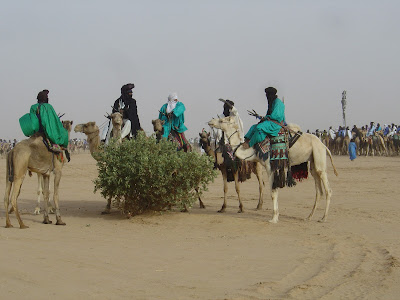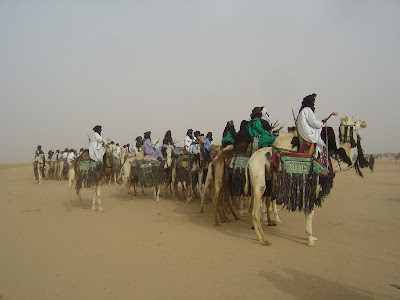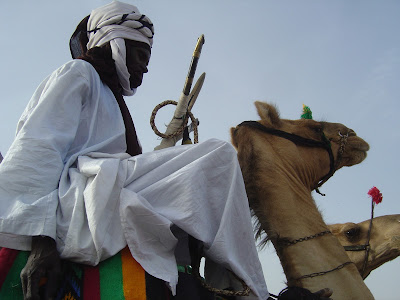We finally found a dark room at the Hotel Agriboun, where the ceiling fan did its best to move the hot air. Streams of people and Toyotas were going to the North – a grande fantasia was to take place in honour of the Colonel. Every 100 metres a soldier stood guard. On the outskirts of town there was an amazing sight - thousands of camel-borne Tuareg and Fula lined up in full ceremonial style surrounded a crowd that represented every tribe in the country, also in their best. The camels stand very patiently flank to flank, not bothered by the size of the crowd. A line of tall young Wodaabé men stood in front of the camels, their faces painted. They are famous for the annual Cure Salée festival, where their make-up and dancing are used to attract a bride. I got the impression they had already being waiting for hours, and after a few requests my water was gone.
In front again were clusters of musicians, dancers and singers, all waiting for the two Presidents to arrive. A stage had been built and furnished with two large cream armchairs. As we waited, a tanker watered the sand of the performance area, and the police made an effort at crowd control. This was generally good-natured. A group – especially the Toureg women – would decide they did not like their vantage point, and they would get up en masse and move. As the army rallied and tried to muster them, another part of the crowd would flow around them. The officers would shout at each other and shrug. But as the time got closer, patience wore and some of the police waved clubs and took to shins with branches. Closer to the stage was patrolled by Libyan officials in khaki, and when the dignitaries arrived they were almost invisible behind another layer of security – although sad to say I could not see any of Gaddafy’s legendary team of female bodyguards. The man himself was just about discernible, dressed in blue robes, as he accepted gifts, including a fine white camel. Then the thousands of camelmen paraded past the stage, to the sounds of women singing and ululating. Fireworks finished the event, as the cavalcade departed in a cloud of dust, and later I heard jets taking off.
The nights in Agadez are oppressive, the houses are ovens, and people move outside to sleep. After one night in the hotel we moved to the house of a Frenchman who has kindly offered to allow us to stay, even though he has departed for France to escape the coming hottest months of the year. His cook is looking after us.
Also guests are a Dutch couple, Leon and Claire, with an ancient British Army Land Rover III and a Norwegian, Haakon, with a motorcycle. We will all join forces for the next part of the journey, through Algeria.













